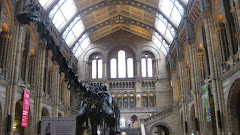I can understand the pique of a Wallace scholar encountering the neglect of his subject. Imagine going through the effort of an Amazonian expedition, the pain of seeing the fruits of that expedition destroyed, the hardship of ten days adrift on a lifeboat, the strain of constant economic insecurity, the effort of another, equally remote and dangerous expedition to Southeast Asia, and the suffering of malaria, all to envisage, finally, the key to understanding evolution. What would it feel like to have to share that discovery? Probably not too bad at first—after all, Wallace returned to England as a naturalist’s hero. I wonder, though, whether Wallace saw Darwin’s fame grow and his diminish through his long life. I noticed this morning at the museum that one of the books Wallace wrote was called Darwinism—I doubt that Darwin ever wrote Wallacism. Was there any kind of Salieri/Mozart dynamic between them (with slightly less drama)? Or was Wallace so well-known during his life, and Darwin’s work for On the Origin of Species so meticulous and complete, that Wallace didn’t mind seeing his colleague praised or lampooned in the press rather than himself? In this case, then, the hurt pride of unjust obscurity is inherited by Wallace historians.

On another topic, I loved seeing Wallace’s insect collection. I think of collections as very common hobby in Victorian times, with gentlemen in their book-lined studies poring over their fossils, beetles, Egyptian artifacts, and whatnot. I can imagine Wallace proudly showing his guests the prey strategy of mimicry demonstrated in his butterfly case. While I’m sure people still do collect rocks, butterflies, etc, I doubt whether we collect artifacts and involve ourselves in science to the same extent as the ordinary Victorian. Perhaps their avidity for collections speaks to the excitement of science when it held a little more mystery—new species of insects and birds cropping up all the time, even mysterious skeletons of long-dead “sea-dragons.”


No comments:
Post a Comment